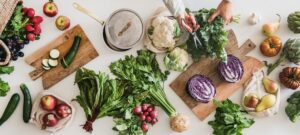
Dr Alyce Churchill


In the fast-paced and demanding world we live in, finding moments of stillness and calm can be challenging. In an attempt to find a little peace...
If you want to get your gut in order, Dr Will Bulsiewicz is the expert to help you sort out fact from fiction. This is the gut-health cheat sheet...
Everybody loves macaroni cheese! And what’s not to love? It’s comfort in a bowl – flavourful, homely, and delicious.
Ramp up your family burger night with crumbed oyster mushrooms and a super tasty, creamy sauce.
Rich and sophisticated, these espresso-enhanced chocolate sponges with delectable chocolate cream topping are guaranteed to dazzle your guests,...
This dish is not only gluten free, but also offers much more of a flavour punch than regular pasta-based cannelloni. It’s a wonderful way to...
Warm up with the perfect hot chocolate, made with cacao, a little sweetness, and a hint of chilli for good measure.
This Indonesian fried noodle dish can be found at both high-end restaurants and street food vendors in the region – it’s a popular dish for...
Lusciously decadent but guilt free, these divine bars are definitive proof that there’s a healthier, plant-based version of anything you fancy....
Spraying sheets and pillows with calming scents can be a wonderful aid to slumber
The next time you go for a walk, discover the wonder of the everyday world around you
A skincare routine can be a way to nourish yourself inside and out
When the clouds converge, practise gratitude for the smallest of glimmers, and learn to dance in the rain.
Can what we eat and drink affect our mental health? You bet it can. Here’s how you can harness the protective power of plants to feel your best.
Most of us know that when we are physically unwell or exhausted, it can negatively impact our mental health – in the ways we think, cope, and act. And how we feel mentally also influences our physical self-care, such as eating well, moving, and resting. The connectedness of our physical and psychological state is undeniably intertwined and is particularly significant for several mental health conditions, including depression and anxiety disorders. Because our physical health is greatly impacted by our diet, there are some protective actions we can take when it comes to what we eat and drink, which can also be beneficial for mental health.
Our body can influence our psychological state through the gastrointestinal tract, or the gut. Our gut has the wonderful ability to communicate with our brain through the enteric nervous system and with chemical messengers (hormones) such as serotonin. Serotonin is produced by specialised cells within our intestines. Foods rich in tryptophan can help increase your production of serotonin, well known for its calming effect as it works to reduce anxiety and improve depression. Choosing plant-based sources can simultaneously help you build a healthy gut microbiome and reduce your risk of many chronic diseases.
Our gut bacteria, or microbiota, are also capable of producing gamma-aminobutyric acid, or GABA, another important chemical made in the brain and found in some foods. GABA works to reduce anxiety and improve mood and sleep. We know eating a wide variety of plants helps to promote a healthy gut microbiome, but are there foods of increased benefit? The science says yes! Fermented foods like kimchi, sauerkraut, and plant-based yoghurt contain GABA and probiotics to nurture your microbiome. Consuming foods rich in glutamate and vitamin B6, the building blocks of GABA, is also beneficial for boosting GABA levels.
Serotonin promoters: the ‘happy hormone’
● Pineapple
● Tofu
● Edamame
● Tomatoes
● Mushrooms
● Leafy greens
● Bananas
● Kiwi fruit
Boosting GABA: the ‘mood improver’
● Kimchi and sauerkraut
● Plant-based yoghurt
● Spinach
● Broccoli
● Brussels sprouts
● Potatoes
● Sweet potatoes
● Adzuki beans
● Mushrooms
The simple act of eating is enough to release dopamine, another feel-good hormone. Unfortunately, high-fat and high-sugar foods are particularly good at causing a dopamine boost. Biologically, this is why a doughnut or ice cream can feel so much more pleasurable than a less indulgent option. The reasons for this are rooted in human species survival and not longevity or good mental health. High-fat and high-sugar foods are addictive, and breaking the cycle of craving and consumption, termed ‘The Pleasure Trap’ by renowned psychologist and researcher Dr Doug Lisle, is important to gain control over your physical and mental health. Breaking up with these foods might be difficult at first, but your taste buds will adapt quickly, your microbiome will improve, and you can continue to enjoy a normal dopamine boost from healthy plant-based foods.

Studies have shown that diets rich in neuroprotective vitamins and minerals such as B vitamins, Omega 3 DHA, iron, magnesium, and zinc are beneficial to our brain and mental health. Deficiencies in these various nutrients can affect your brain’s development, learning and memory, as well as increase the risk of feeling irritable, stressed, and fatigued. Fortunately, your nutritional needs can be easily met by eating a wide variety of plants. Here’s where to find these neuroprotective nutrients.
Vitamin B6 – bananas, watermelon, peanut butter, almonds, sweet potatoes, peas, avocados, hempseeds, chia seeds, beans, chickpeas, prunes, wheat germ, sunflower seeds, pineapple, pumpkin, green beans, pistachios, figs, nutritional yeast, baker’s yeast, garlic, kale.
Vitamin B9 – spinach, beans, lentils, asparagus, lettuce, tomatoes, broccoli, avocados, mangoes, oranges, most wholegrains, nutritional yeast, baker’s yeast, basil, peanuts, artichokes, rock melon, walnuts, flaxseeds, sesame seeds, cauliflower, tahini, sunflower seeds, peas, okra, celery.
Vitamin B12 – supplementation is recommended and can easily be found in pharmacies. Also found in some fortified cereals, fortified plant-based milks, and nutritional yeast.
Omega 3 DHA – flaxseeds, chia seeds, hempseeds, dark leafy greens, seaweed.
Iron – legumes, dark leafy greens, broccoli, nuts, dried fruit, iron-fortified bread and cereals, oats, tofu.
Magnesium – kelp, oats, almonds, cashews, seeds, cacao, dark leafy greens, bananas, sweet potato, wholegrains, beans, wild and brown rice.
Zinc – legumes, nuts, seeds, oats, tofu.
How much you hydrate, and with what fluids, can impact on your concentration, mood, and anxiety symptoms. It can even affect your sleep. Regularly and adequately hydrating with water and other healthful options, such as herbal tea, can improve your focus, increase your performance, reduce fatigue, and best support your psychological wellbeing.
However, there are some beverages that can negatively affect our mental health. Alcohol and caffeinated drinks are the main culprits. Caffeine acts as a stimulant to our nervous system, with enticing effects such as a reduction in fatigue, increased alertness, and improved mental performance. These effects are temporary and have to be weighed up against other well-known side effects, including increased heart rate and blood pressure, increased feelings of anxiety, restlessness, difficulties with sleep, and diuretic effect (the need to urinate more frequently). Good hydration can be an uphill battle if you’ve already had a few coffees by mid-morning.
Then there’s alcohol, which is quite a messy substance for the brain. The anticipation and consumption of alcohol can produce a satisfying but temporary increase in dopamine. However, regular consumption, and in particular alcohol-dependency and withdrawal states, leads to suppression of serotonin and GABA production (our happy hormones and mood improvers mentioned earlier). This can reduce your ability to manage stress, increase anxiety and panic, and result in lower mood. Alcohol is also no friend to your gut microbiome.
Drinking more water, eating a lot more whole plant foods, and consuming less refined products can give many people a much-desired boost in both their mental and physical health. This is one nutrition prescription that is widely accessible, relatively easy to implement, economical, and comes with a long list of additional health benefits.
If you are struggling with your mental health, it’s also important to talk to your GP, psychiatrist, or psychologist, so that the most appropriate treatment options for you can be considered: dietary change should be seen as a complementary treatment, not a substitute.
Of course, even if you aren’t currently experiencing a mental health issue, it’s beneficial to consume foods that contain neuroprotective nutrients and that promote good gut health, which can affect hormone production and mental health. And this can be as simple as focusing on eating a wide variety of whole plant foods and keeping well hydrated.
***
Dr Alyce Churchill will be speaking at Doctors For Nutrition’s upcoming Nutrition in Healthcare Conference, taking place in Melbourne from 17–19 February 2023. The conference will bring together leading experts on whole food plant-based eating and its positive effects on your health and the environment.
To learn more and register, visit doctorsfornutrition.org/nihc
Lead image: Kulbir on Pexels
In the fast-paced and demanding world we live in, finding moments of stillness and calm can be challenging. In an attempt to find a little peace...
If you want to get your gut in order, Dr Will Bulsiewicz is the expert to help you sort out fact from fiction. This is the gut-health cheat sheet...
Spraying sheets and pillows with calming scents can be a wonderful aid to slumber
The next time you go for a walk, discover the wonder of the everyday world around you
A skincare routine can be a way to nourish yourself inside and out
When the clouds converge, practise gratitude for the smallest of glimmers, and learn to dance in the rain.